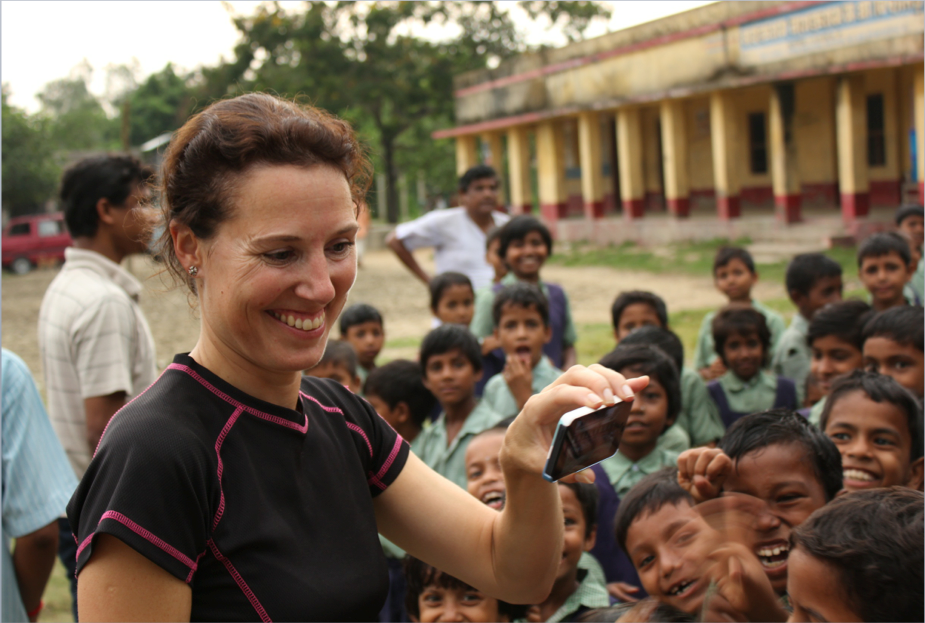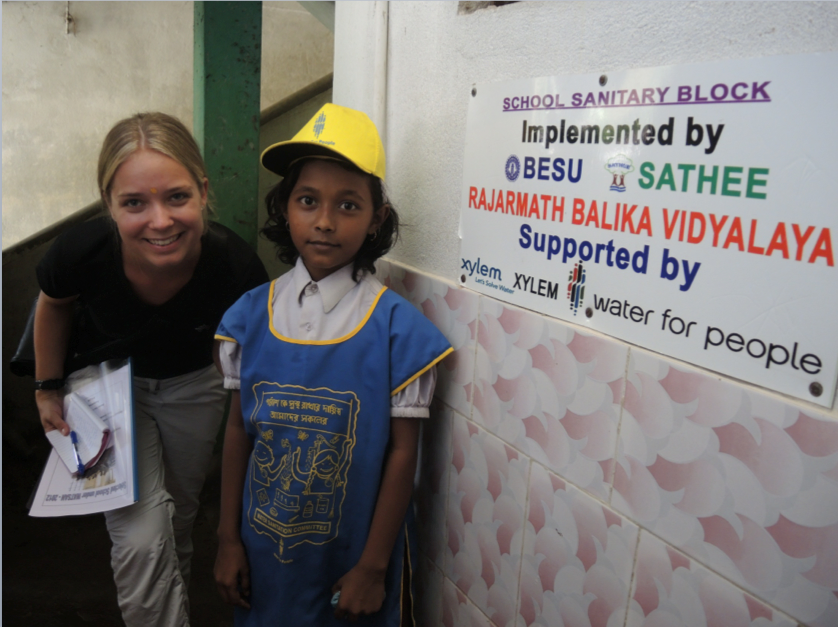On a recent trip to India, Xylem employee Cecilia Holmquist Östling heard firsthand from school girls in West Bengal how new sanitation facilities have helped them stay in school. In India the dropout rate for girls in their teen years can soar, especially at schools where facilities are unavailable to girls who are menstruating. A program led by Water For People with Xylem Watermark’s support is helping change this.
Last year Cecilia Holmquist Östling travelled to India with six other Xylem employees, working as volunteers with Xylem Watermark, the company’s corporate responsibility and social investment program. Their goal was to monitor drinking water stations and sanitation facilities in the region that had been installed by Water For People and interview school principals and students.
“We were based in Calcutta and every day drove several hours out into the countryside to visit schools,” Holmquist Östling says. “Since we were there during the monsoon season, some of the roads were in bad condition so we went on motorbikes or walked in some cases. We visited three to four schools every day.”

Cecilia Holmquist Östling visiting a school in India
Water For People, a nonprofit that focuses on long-lasting water and sanitation solutions, chose West Bengal for their program because of its low access to safe drinking water and sanitation facilities. More than 1,000 children die every day in India as a result of diseases carried in dirty water, and 55 percent of the population practices open defecation.
The monitoring visits, both the local assessments and the follow ups, are important, says Holmquist Östling, in order to ensure that the installed facilities are still working and meeting the needs of the school.
Girl-focused school program
Water For People began full-fledged operations in India in 2005, and partnered with Xylem Watermark on this program in 2008.
“We monitored our work at schools in 2008, and we found that the facilities we were constructing weren’t being used as expected,” says Katja Neubauer, Water For People’s regional program officer for Africa and India. “The monitoring showed that girls in particular didn’t feel comfortable using the facilities, for example because some of them were placed so that they had to walk past all of the classes to use them.”
As a result, Water For People began its girl-focused school program, where they put girls in charge of helping design the sanitation facilities. The new designs included better placement of the facilities in back of the school or to the side, changing rooms, and incinerators attached to the bathrooms to discretely dispose of any sanitary napkins.
Lack of sanitation for girls in India is a serious problem, says Neubauer. At least 23 percent of girls in India leave school when they start menstruating and the rest miss an average of five days during each monthly menstrual period between the ages of 12 and 18, according to the Water Supply & Sanitation Collaborative Council.
“We are currently testing having vending machines for sanitary napkins in the bathrooms to make the girls feel more comfortable,” Neubauer says. “We also focus on hygiene education programs to dispel myths around menstruation in particular.”

A sanitary block supported by Xylem Watermark and Water For People
Providing sustainable solutions
Water For People’s girl-focused school program is part of its Everyone Forever initiative, which aims to provide water and sanitation for everyone. The organization brings together local entrepreneurs, civil society, governments and communities to establish long-lasting solutions that enable people to maintain their own water systems.
“Since 2008, Water For People and Xylem Watermark have reached 426 schools and 49 communities globally,” Neubauer says. “In addition, we’ve had about 100 Xylem Watermark employee volunteers monitor our programs, which is critical to the success of our work. They identify strengths and weaknesses and look at how we can make improvements.”
For Xylem Watermark volunteer Cecilia Holmquist Östling, the trip to India made a lasting impression. “It was a once-in-a-lifetime experience and a real eye opener,” she says. “The students were so happy to see us, and had arranged dances and performances for us. You could see how much they appreciated this work. The girls said that before they didn’t have any toilets or access to fresh water. Now they feel safe and accepted.”

